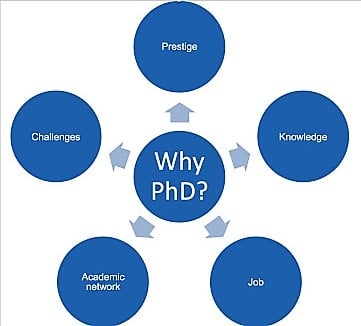It’s a question that almost every aspiring scientist faces, and one of the most path-determining choices you’ll make. There’s no one-size-fits-all answer, of course, but there are a lot of factors you’ll want to consider when deciding what’s right for you.

Here’s what you’re considering: a Ph.D. program is a course of study with a thesis - an original research contribution to knowledge in the field - leading to a doctorate degree. Entering a Ph.D. program in the sciences you can expect:
- To take between 4.88 and 5.73 years (in the US, varying by field of biomedical science)
- A 57% likelihood of eventually completing the degree (in the U.S., all fields).
- To work well more than 40 hours a week, with nights and weekends as needed.
- To receive a stipend of just over $28,000 per year (in the US, 2017)
Sound daunting yet?
It’s a long road and a big investment, and with a bachelor’s degree in the sciences, you’re fortunate to have other options. You can join the workforce with your current qualifications or enter a different type of graduate program. So what to consider before taking the leap?
An Education, not Just a Degree
Throughout your 4-6 years, you will be working toward much more than just a degree, you will be making a novel contribution to knowledge in your field of interest. In the most literal sense, you will be learning how to learn - a useful skill no matter what career path you end up following.
While developing your thesis project and eventually defending it to a panel of experts you will learn several invaluable skills that will serve you well: working as part of a team as well as effective communication.
Unique Career Options
A Ph.D. can open the door to opportunities that simply aren’t available to people with a Bachelor's or Master's degree. If your goal is an academic career of conducting your own research, you’ll need a doctorate. Outside the world of academia, Chief Scientific Officer positions and many high-level industry positions are only available with a Ph.D. This is not to say that you can’t make contributions or do interesting work without a doctorate. The industry has many positions for individuals in research and development, including management positions, filled by people with Bachelor's or Master's degrees.
Job Security
Ph.D.s do earn more on average than non-PhDs, but in many fields the difference in earning potential compared to a bachelor's or master's degree is negligible. According to the most recent NSF report, out of the 662,600 work-ready science PhDs in the United States, only 11,400 were unemployed - an unemployment rate of 1.7%. The most comparable numbers for those with bachelor’s degrees in the physical and biological sciences are 2.7% and 3.0%. So although it may not be the fastest or easiest way to increase your earning power, it may make it easier to find a job.
Ph.D. graduates have valuable skills that increase their chances of employment but bear in mind that a Ph.D. is not the finish line. 47% of STEM Ph.D. recipients go on to do a postdoc, but only 23% will obtain a faculty position.
Don’t decide before you have to!
This doesn’t mean procrastinating. Instead, while you’re still an undergraduate, seriously consider all options before making up your mind. Do your research - talk to people in the industry to get a feel for their experiences and challenges, get the perspective of grad students and professors, and look up graduation rates and employment rates for your specific area of interest.
An application is not a commitment to enroll. If you’re on the fence about whether to apply, go for it! See what opportunities are available to you. At the same time, explore the job market. It’s a lot easier to make an informed choice between a specific graduate program and a specific job opportunity. Assemble your options and consider the specifics, then make a decision.
The good news is that either choice can lead to a meaningful career in science. Either way, entering the workforce or getting a Ph.D. is just the beginning of a long road of learning, adapting, and building skills to stay competitive.
.png)
